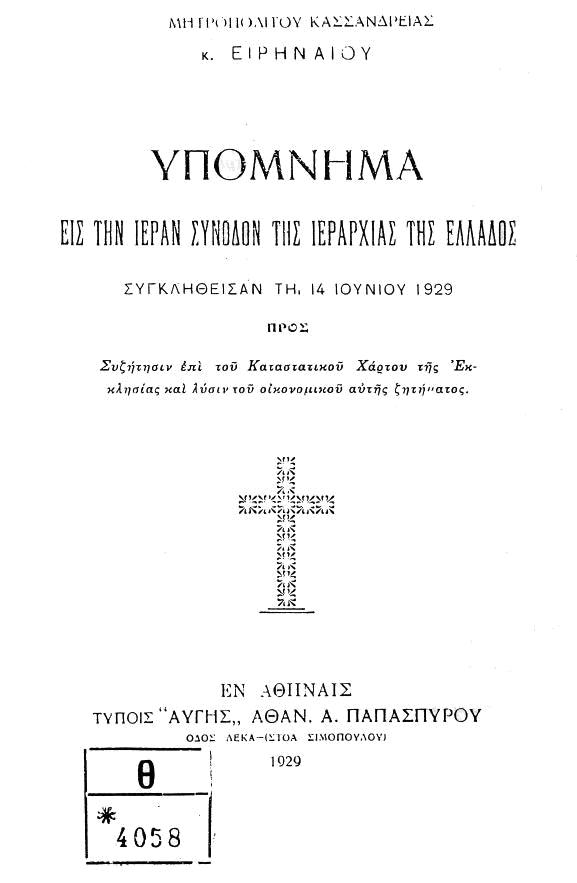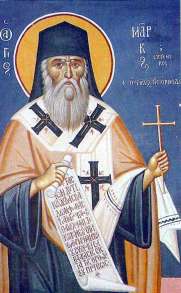“A Painful Remembrance”
1924‐2004: The Eightieth Anniversary of the Calendar Reform
«Тягостное воспоминание»
1924-2004, восьмидесятилетний срок спустя введения
Календарной реформы
Œcumenical Patriarch Meletios (Metaxakis) (1871-1935)*
Вселенский Патриарх Мелетий (Метаксакис)
(1871-1935)*
а) масон, б) модернист, в) экуменист
II
Patriarch Meletios Metaxakis
as an Innovator and Modernist.
Патриарх Мелетий Метаксакис как реформатор и модернист
![]() n 1929, Metropolitan Irenæus of Cassandreia submitted a very important Memorandum to the “Holy Synod of the Hierarchy of Greece, convened on 14 June 1929,”¹⁰ which, among many other topics, deals with Meletios Metaxakis in astonishingly severe terms. What the ever-memorable Metropolitan Irenæus says is indisputable, since it is corroborated by a host of other testimonies. Paragraphs four and five of this historic Memorandum serve as a veritable catapult against the truly “pernicious Patriarch Meletios Metaxakis.” Let us, then, examine some extracts from the Memorandum by this Hierarch, which are indeed revealing.
n 1929, Metropolitan Irenæus of Cassandreia submitted a very important Memorandum to the “Holy Synod of the Hierarchy of Greece, convened on 14 June 1929,”¹⁰ which, among many other topics, deals with Meletios Metaxakis in astonishingly severe terms. What the ever-memorable Metropolitan Irenæus says is indisputable, since it is corroborated by a host of other testimonies. Paragraphs four and five of this historic Memorandum serve as a veritable catapult against the truly “pernicious Patriarch Meletios Metaxakis.” Let us, then, examine some extracts from the Memorandum by this Hierarch, which are indeed revealing.
The spirit of innovationism and rebellion against the good and sound canonical order of the Eastern Orthodox Church was incarnate in the person of the pernicious Patriarch Meletios Metaxakis, who, adopting ideas that are preached sporadically, according to the whim of each individual, in periodicals and the daily press and are given wide diffusion, opportunely and inopportunely, satisfying the sinful wishes and self- serving desires of heterodox churches and secret societies,¹¹ to which, blinded by vainglory and sacrificing everything for the enhancement of his own ego, he owed his successive accession to the highest positions in the local Orthodox Churches,¹² convened a Pan-Orthodox Congress—unusual nomenclature in ecclesiastical parlance—which was, in truth, an anti-Orthodox one, in May of 1923 in Constantinople, at which...he replaced the ecclesiastical Julian Calendar with the Gregorian, in spite of every prohibition relating to this; and he decided to replace the eternal Paschalion, which was drawn up for the Orthodox Church by a decision of the First Œcumenical Synod, entrusting the creation of an astronomically more perfect one to the observatories of Bucharest, Belgrade, and Athens; he allowed Priests to cut their hair and to replace their venerable clerical attire with that of Anglican pastors; in violation of the Canons, he introduced the marriage [after ordination—Trans.] and second marriage of clergymen; and he entrusted the determination of the days of fasting and the manner of their observance to the judgment of the local Churches, thereby destroying the uniformity and order that have prevailed in the local autocephalous Orthodox Churches of the East.¹³

The cover of the pamphlet containing the historic Memoradum of Metropolitan Irenæus of Cassandreia.
Acting in this way, he opened wide the gates to every innovation, abol- ishing the distinctive ethos of the Eastern Orthodox Church, according to which she preserves, genuinely and without innovation, everything that she has received from the Lord, the Apostles, the Fathers, and the Œcumenical and local Synods....
What right did this outsider ¹⁴ have to convene a Pan-Orthodox Congress without consulting the local Metropolitans of the Œcumenical Throne? And according to what law or Canon did the leader of a single local Church decide to annul a decree made by all of the Patriarchs of the East—indeed, by those Patriarchs who were so distinguished in the history of the Church after the fall of Constantinople, to wit, Jeremiah II of Constantinople, Meletios (Pegas) of Alexandria, Joachim of Antioch, and Sophronios of Jerusalem—on the question of the calendar and the Paschalion? ¹⁵ Is it permitted, in civil matters, for a lower court to reverse the decision of a higher court? Does a court of the first instance, for example, have the right to overturn the decision of a court of appeal? Neither the rulers nor the people have any respect for Bishops who show disrespect for the established order of their own Church. The people have contempt and disdain for Priests of the Most High who try to make themselves popular and who, through various innovations, divert the Church from the sacred and holy royal path, which the Godly-Minded Fathers and the Divinely-Assembled Synods have marked out for her.
The innovations of Meletios Metaxakis have not only alienated from the sacred Churches those faithful children of Orthodoxy who believe correctly and with simple hearts, and who do not reckon the established order of the Church to be susceptible to additions or innovations, bringing about the depopulation of such Churches in rural areas..., but have also divided into three groups the ancient autocephalous Eastern Orthodox daughter Churches, who were formerly renowned for their enviable sisterly love, concord, unity of faith, and simultaneous worship and praise of God, Who is holy; into two groups, with regard to the calendar, and into
a third, with regard to the Paschalion.¹⁶
And we have become witnesses of a grievous event: the fact that the Romanian Orthodox Church celebrated Holy Pascha this year five Sundays earlier than the rest of the Orthodox Churches,¹⁷ in flagrant violation of, and contempt for, the decisions and wishes of the First Œcumenical Synod....
It is a known fact that the Romanian Church paid for this violation of unity in the celebration of the light-bearing Resurrection of the Lord with the secession of the Orthodox of Bessarabia and other Romanian Orthodox, about eight million people in all, who celebrated the Holy Pascha along with those who observe the ancient order of the Eastern Orthodox Church.
No one wishes to be a prophet of doom, but...

